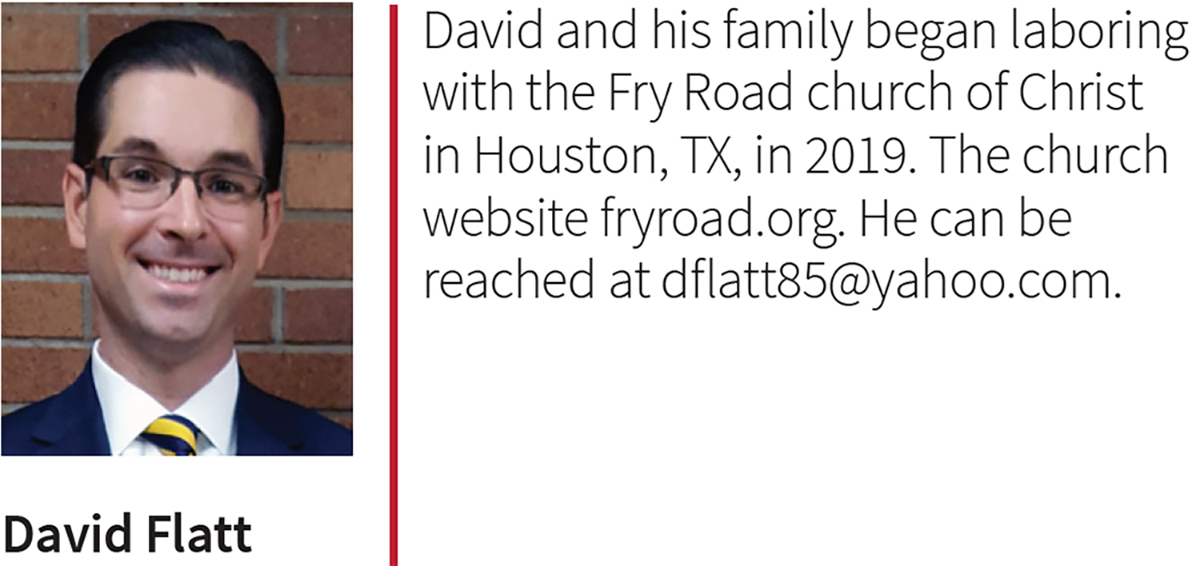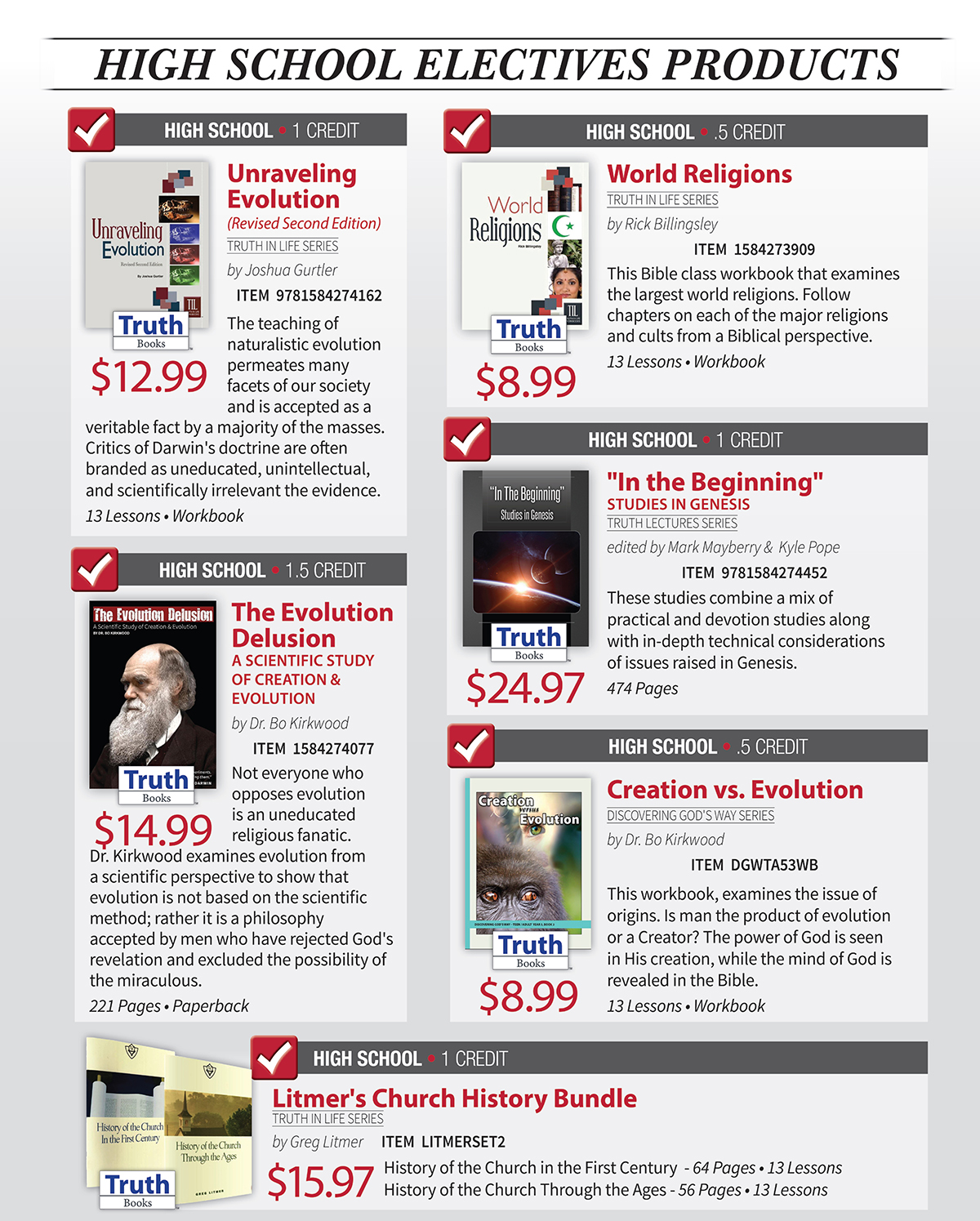by David Flatt
Synopsis: Focusing on the text of Romans 14-15:7, David considers the inspired apostle’s instructions for unifying saints of differing personal convictions.
There is no more significant example of Paul explaining the challenges of unity among saints than this section in Romans. Instead of merely commanding saints to be united, he deals with specific issues threatening the unity of the saints. While we may not struggle with these particular matters, we are often challenged to respect one another’s conscience.
Being a vegetarian is not new to our time. In the ancient world, people chose vegetarianism for religious reasons. For example, Jews living outside Israel might have chosen to be vegetarian. Pagans sold most of the meat available in the market. Observant Jews could not ensure that the meat had been prepared according to kosher standards. Also, pagans, who had converted to Christianity, were all too familiar with meat being sacrificed to idols. This meat was only a reminder of the lifestyle they once lived and had renounced. So, Paul addresses a practical concern of his time.
This is similar to what Paul wrote in 1 Corinthians 8. In that passage, he makes two points: (1) God is the creator of all; therefore, all meat could be eaten with thanksgiving. (2) If someone’s eating of meat harmed another saint’s conscience, he should not eat meat in their presence. Now in Romans 14, Paul expands the discussion of this issue.
First, notice Paul’s diplomatic approach in this passage. He does not assume Jewish converts are vegetarians, and Gentile converts are meat eaters. Why? There likely were vegetarian and meat eaters among both groups. Making sweeping generalizations would only reinforce the differences which were keeping these two groups segregated. Paul is trying to remove cultural barriers between these two groups. Ultimately, Paul wants these two groups to worship together as servants of the same Master (Rom. 15:5-7).
Paul is dealing with a specific consequence of the doctrine of justification by faith. If we are justified by faith, then what people eat or the days they exalt are insignificant. Matters of personal conscience are not—and cannot—be the basis of unity. The only basis of unity is faith in what God did through Jesus Christ and the gospel message.
Therefore, saints must not look condescendingly at one another due to personal judgments based on conscience. The one who abstains is not holier than the one who partakes. The one who observes a particular day as sacred is not holier than those who view that same day as common. In Christ, saints have flexibility concerning issues of conscience.
Who are the “weak in faith”? What does Paul mean by this description? He does not suggest that such individuals had a shallow commitment to Christ. They did not doubt the Messiahship of Jesus. This group had not yet realized the full consequences of being justified by faith (Rom. 1:16-17). They still felt that observing specific dietary guidelines and/or keeping certain holidays was necessary for their justification.
This was the central issue at Corinth. Paul wrote, “For although there may be so-called gods in heaven or on earth—as indeed there are many “gods” and many “lords”—yet for us, there is one God, the Father, from whom are all things and for whom we exist, and one Lord, Jesus Christ, through whom are all things and through whom we exist. However, not all possess this knowledge. Because of their former association with idols, some ate such food as if it was offered to an idol, and their conscience, being weak, is defiled (1 Cor. 8:5-7). These saints knew there was one God and one Lord, Jesus Christ. Although they had obeyed the gospel, they did not fully recognize the consequence of this truth.
With the saints at Rome and Corinth, Paul was dealing with issues of conscience. The word “conscience” means “with knowledge.” We make judgments and form opinions based on the knowledge we possess. As we grow in our understanding or discernment, our judgments and views often change over time and experience. Therefore, we must respect one another’s personal opinions and judgments, recognizing that knowledge and experiences vary.
It does not appear that the “weak in faith” were imposing their views on other saints. If some of this group were Jewish, there is no indication that they were like the Judaizing teachers Paul frequently engaged. When Paul dealt with Judaizing teachers, he rebuked them and declared them to be false teachers. Paul never permits tolerance toward false teachers.
Paul begins this chapter by instructing the “strong” to welcome the “weak.” In chapter 15, Paul tells the saints to receive one another as Christ had received them (Rom. 15:7). To receive means “to grant access into one’s heart; to take into friendship” (Greek definition of the term translated “receive”). Christ receives us based on faith, i.e., our reliance upon and obedience to Him. Therefore, faith in Christ is the only basis by which we are to receive other saints. Food was not a test of receiving other saints.
We would be wise to consider if we are guilty of judging one another based on criteria regarding which God is indifferent. Building barriers along cultural and ethnic lines is easy to do. Using worldly standards of judgment, however, will never bring unity. We must not conform to the world but seek transformation by renewing our minds (Rom. 12:1-2).
Paul is trying to reconcile opposing parties in the church. Sound familiar? It is as if an older brother is trying to get his younger siblings to get along. Yet, who are these disputants? Let us paraphrase the following scenario that N.T. Wright uses in his commentary on this passage:
One Christian has a strict conscience. His background, upbringing, and temperament all incline him toward a stringent view of his moral responsibilities. To him, the world is a wicked and corrupt place and needs to be shunned. If this view demands he abstains from meat, then he will choose to be vegetarian. But then, he notices a fellow-Christian. She goes to the market and buys meat, which came from the pagan temple. To him, this is appalling. He thinks, “What kind of Christian would buy this meat and feed it to their family?”
However, this woman has been taught that God is the Creator and Redeemer of all things. The whole world belongs to Him, even the meat she buys for her family. She knows she has been called to live a holy life, distinct and different from the pagan world. Yet, she also knows those outward regulations about what you can and cannot touch or eat do not get to the heart of genuine holiness. She tires of being criticized by other Christians who have not learned one of the most basic, liberating gospel concepts. To her, such Christians are small-minded, driven by fear, and unable to see beyond their own front doors (Wright, 100-101).
As Wright observes, both perspectives come from a clear understanding of one part of Christian truth. However, Paul reminds the saints of a truth which rises far above both: There is one Lord, and it is before Him alone that every Christian lives and dies, stands or falls. This is why no one has the right to look with disdain towards his fellow-Christian. No one is in the position to pass judgment on another based on his personal conviction.
Knowledge of God’s judgment must temper our judgments of others. Jesus taught this in the Sermon on the Mount (Matt. 7:1-2). If we are harsh, hypocritical, or merciless in judging others, we will receive judgment without mercy. God will have the final say over us all. Before enforcing our day-to-day judgments on others, the knowledge that God is our judge must shape our conduct.
Distinguishing areas in which God gives us flexibility and those where He demands total conformity requires a complete examination of the Scriptures. As issues develop, we must approach each on a case-by-case basis. Matters in which disagreements arise cannot be resolved by simply “agreeing to disagree.” Why? God’s judgment of us all. If someone practices something or fails to practice something that will result in God’s judgment, we ought to love one another enough to point out the danger—and prove it with the Scriptures.
As saints, we have been justified/welcomed into God’s family by faith. Therefore, we owe one another mutual love and respect. This is in the background of what Paul emphasizes in this paragraph. Thus, Paul explains how love is the path to peace. To make his point, Paul uses the illustration of walking.
Paul warns against the danger of clearing our path, but in so doing, obstructing the path of another. During Ohio winters, plow trucks would plow snow off the street. However, the plowed snow from the trucks would block my driveway. In clearing our path in life, we must be considerate. If not, we may put stumbling blocks in the path of another. We must never make the path to Heaven for our brethren more rigorous than it already is. Paul teaches us how we can help each other get to Heaven despite our different personal convictions over food and holidays.
We must be cautious when determining our path regarding issues about which God grants us liberty. We must concern ourselves less with how such matters affect us personally and more about how our approach to such issues will affect those around us. Sometimes we are tempted to tell someone who is “weak in faith” that he needs to “study more and grow.” While Christians do, indeed, need to study and grow, this is not Paul’s primary focus in this passage.
Those who are “weak in faith” are not necessarily immature in the faith. Although Paul offers guidance on meats and days, he never tells the “weak in faith” that they must change their practice. Those who are “weak in faith” may, in time, recognize more fully the consequences of being justified by faith and cease struggling over food or holidays. The weak brother must not condemn the strong, nor vice-versa. It was unnecessary for either group to alter their practice on these issues, except where one might cause his brother to sin.
Overall, Paul is saying that something may not be wrong, in and of itself, but become wrong because of how it may impact others. Food is food; however, the consumption of certain foods could become wrong if doing so caused one’s brother to stumble. Therefore, Paul appeals to saints willing to eat anything: they needed to act with love and restraint towards brethren who did not believe they could eat everything.
For example, if a meat eater invited a vegetarian into his home for dinner, Paul would have told him not to serve meat. His vegetarian brother views eating meat as sinful. If the meat eater served meat to the vegetarian brother, he would put his vegetarian brother in a position to violate his conscience. Paul says the vegetarian would be condemned if he ate. In other words, the meat eater could cause the vegetarian to quit serving God altogether: i.e., abandon the faith. Paul could not accept the thought of potentially obstructing another’s salvation.
There may be occasions when our liberty must be restrained for the sake of those who have not realized the full extent of being justified by faith. Paul wants the “strong” to understand that using their freedom in certain situations could do irreparable damage to their brethren who were “weak in faith.” Such restraint is a demonstration of brotherly love (Gal. 5:13-16).
Love is the path to peace in the local church. Just as the Messiah redeemed humanity by self-giving love, the least we can do is sacrifice for the sake of another’s salvation. We need to avoid selfishly taking advantage of one another. Some may be tempted to object to a practice by claiming to be “weak in faith,” but in reality, such persons are manipulative. This temptation must be resisted. Remember, maturity is not found in being weak or strong on such matters. Maturity is found in being able to recognize an opinion as such and not imposing it on others.
The strong are to bear with the weak. The strong are to be considerate of the personal judgments of the weak in faith. Paul reminds the saints how the Messiah had to do something difficult (Psalm 69). The Messiah bore the suffering of the world for the benefit of everyone and to please His Father (Phil. 2:5-11). He exemplifies the strong bearing the infirmities of the weak. Therefore, in a much smaller sense, Paul asks the strong to do for the weak what Jesus did for the world.
This principle is also exemplified by Old Testament examples of how hope was realized by forbearance. The text is filled with harrowing accounts of God’s people doing what is difficult. It contains cautionary anecdotes of them succumbing to worldly influences. The Old Testament gives examples of the principle of forbearance that Paul advocates in Romans.
Paul uses the Messiah and the Old Testament to encourage unity between the strong and weak. The Messiah and the Old Testament become the foundation of unity. Paul wanted the weak and strong to look at each other with love and equality. They were together in Christ. By shared belief in Christ, they could glorify God with one voice.
While Paul went into detail about a specific matter hindering unity, there did not seem to be an open hostility among the saints in Rome. The issue of eating meat could have been as subtle as how brethren of different convictions thought of each other. Regardless, open hostility and subtle condescension destroy unity.
We live in a time of heightened polarization. As a society, we are deeply divided politically, racially, and economically. The chasms are only widening. Sadder yet is how this polarization has shaped the attitudes and behaviors of some saints. Evidence of conformity to the world may be proven by one’s discourse on social media and elsewhere. Worldly opinions, sentiments, and philosophies are dividing God’s family. Our light, which is only illuminated by unity, is being dimmed. Therefore, this section of Romans is of urgent necessity in our study and teaching.
How we view each other significantly affects our relationships. If we think less of certain saints, we will be less likely to engage them in conversation, give thought to their needs, be sympathetic to their problems, or value their perspective. When we overtly or quietly treat each other with disdain, we create a corrosive atmosphere in the local church. Paul was deeply concerned about this happening among the saints in Rome. Rather than being at odds with each other, he wanted them to treat each other like a loving family. Unity demands renewal (Rom. 12:1-2). Only renewed faith and love in the Messiah will bring us together to glorify God with one voice.


Now may the God who gives perseverance and encouragement grant you to be of the same mind with one another according to Christ Jesus, so that with one accord you may with one voice glorify the God and Father of our Lord Jesus Christ (Rom. 15:5–6).

